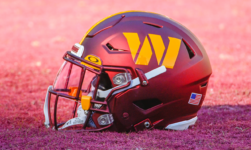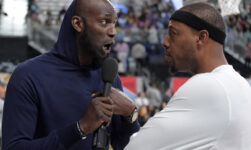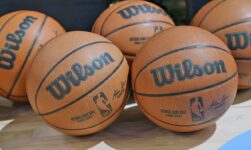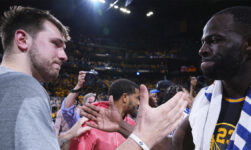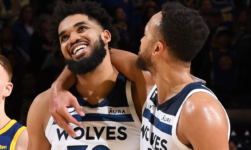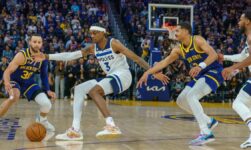Nobody likes the “I told you so” guy, but I told you so. Anthony Davis was always going to get hurt. When he was playing out of his mind and the Lakers were tricking themselves into thinking they had something going as currently constructed, they should’ve been out canvassing the league for a sell-high trade that was always going to be a temporary opportunity for whatever length of time Davis managed to keep his next inevitable injury at bay.
It turned out to be less that two weeks after I wrote this.
Right now, at this very moment, Anthony Davis is the best basketball player in the world. We haven’t, even for a stretch, been able to say that for a long time, and who knows how long we’ll be able to keep saying it this time. But it’s true right now, and the Lakers have an organizational obligation not to waste this opportunity.
Either cash in the draft picks and bring in some help, or move Davis at his highest point of value. To me, either would be a defensible decision, but I would lean toward trading Davis. I don’t think he can stay healthy, plain and simple. Once he gets hurt again, his trade value will plummet and the Lakers will be done, if they’re not done already.
This time it’s a right foot injury that is expected to keep Davis out for at least a month, per the Athletic’s Shams Charania, who also noted that the Lakers are bracing for an indefinite absence from Davis. Chances are, based on his injury and recovery history, he’s going to be out more than a month.
My colleague Sam Quinn says LeBron James now has to keep the Lakers afloat until Davis can get back. Sam is a supremely sharp basketball mind and something of a Lakers expert, so I say this in my most sincere Mark Jackson “with all due respect” voice: Sorry, Sam. It ain’t happening. The Lakers are cooked.
They were probably cooked all along. When I wrote that the Lakers should’ve sold high on Davis, I qualified it by saying their only other reasonable option if they wanted to have something to show for this little Davis spurt was to give up their coveted draft picks and bring in some reinforcements. Because this team, as currently constructed, and even with Davis playing at an MVP level, was never going to be good enough to truly compete. Getting in the playoffs would’ve been an uphill climb.
As I wrote, trading for reinforcements could’ve lightened some of Davis’ load (perhaps it could’ve prevented this injury, though that is obviously impossible to say), or at the very least it could’ve provided LeBron with more help to weather the inevitable Davis injury — whenever it did occur.
To be fair, they could still make a trade right now to get LeBron some help in keeping the ship afloat in preparation for Davis’ return, but the same question has to be asked: Whenever Davis gets back from this foot issue, how long will he be able to stay on the court this time? I mean fool me once, you know what I’m saying?
This really does stink. Davis was playing absolutely incredible and the Lakers were genuinely turning into a pretty good team. There was real energy developing. But this isn’t a hindsight-is-20-20 situation. This was pretty easy to see coming. Davis walks around as though he has shards of glass in shoes. He spends more time on the floor than just about anyone in the league, and nobody gets up with more of a grimace. The man presses his hand against his aching lower back with the regularity of a lifelong lumber-mill worker.
I’m not an insider. I don’t have any idea if the Lakers actually did reach out about trading Davis during his sky-high stretch. I doubt it. My guess is something would’ve been reported. News like that doesn’t stay under wraps these days. Besides that, I don’t know what the Lakers could’ve gotten for Davis. I’m certainly not the only one who questions his ability to stay healthy. Maybe his value wasn’t as high as I thought, even when he was the best player in the league for a moment.
But I’m betting if the Lakers were properly motivated, a good, solid deal that could’ve really set them back up for the post-LeBron era could’ve been achieved. Then they could’ve traded LeBron after the season when he becomes eligible. Put that together with the 2027 and 2029 picks, and you’re in a pretty good spot. You got your one title out of Davis and LeBron and still managed to recoup some value.
Now? Davis is hurt. As was always going to be the case. The buzz of his short-lived healthy dominance has again been replaced by the reality of his fragility, and he’ll be 30 in March and in a walk year next season making $40 million, further complicating his market moving forward. Chances are, Davis will never be as valuable as he was a month or even a few weeks ago.
As for the Lakers, who are already four games under .500 heading into this stretch without Davis, well, they’re back to being cooked. Yes, I know they beat Denver mostly without AD and the Wizards entirely without him. They’re still cooked. Even if LeBron is able to somehow patch this thing together until AD gets back, again, what are the chances he remains healthy the rest of the season and all through the playoffs if the Lakers were to make it that far? Read the handwriting on the wall.
Maybe it was always going to be this way for the Lakers. This season has been plagued pretty much from the start. But there was a window there when Davis was playing so incredible that some team could’ve gotten drunk enough on the idea of adding him to their own title chase to pay off a lot of Lakers debt.
But I said it when I wrote the article almost two weeks ago: Rob Pelinka hasn’t done very many smart things during his time with the Lakers, and certainly not the last few years, and indeed there was no reason to believe he would do something smart with Davis this time when he had the chance.
Having said that, the chances of Rob Pelinka having the guts to trade Davis while he’s playing like this, to say nothing of the Klutch factor, feels pretty close to zero.
So here we are. It stinks for Davis and LeBron and for the Lakers as a whole. But anyone who says they couldn’t see this coming simply wasn’t looking.

